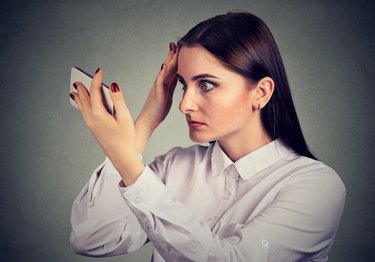
High-protein diets are popular choices for people looking to lose weight or build muscle. But if you suddenly find yourself shedding more hair than usual on this diet, you may wonder if it's related and how nutrients can play a part. Here's the lowdown on high-protein diets and hair loss.
Video of the Day
Video of the Day
High-Protein Diets and Hair Loss
Generally, a high-protein diet doesn't cause hair loss. In fact, getting enough protein is crucial for healthy hair growth, according to Lynne J. Goldberg, MD, a professor of dermatology at Boston University School of Medicine and director of the Hair Clinic at Boston Medical Center.
"Protein calorie malnutrition can definitely lead to changes in the hair," Dr. Goldberg says. But, she says, that's not usually a problem for patients in the United States, where people typically consume enough protein.
However, a drastic change in your diet that results in large amounts of weight loss could lead to hair loss, Dr. Goldberg says. But she typically only sees that level of nutrient deficiency in patients who've had gastric bypass surgery, or those with gastrointestinal disorders (Crohn's, celiac) or a mental health condition like anorexia.
That said, a very strict high-protein diet that makes you so full that you can't eat enough of anything else could potentially also be a culprit, she says.
"A lot of times, if the diet is out of whack and it's very high-protein, it may be missing out on other nutrients," Dr. Goldberg says. "So I don't think it's particularly the amount of protein itself, I think it's really what else is in the diet — what else could be deficient."
Effect of Diet on Hair
If you find yourself losing more hair than usual and think it is related to extreme dieting, eating a more balanced diet should help put a stop to it.
According to a September 2015 review in the Journal of Clinical & Diagnostic Research (JCDR), a balanced diet is crucial in preventing hair loss, and a crash diet is one of several listed stressors that can lead to telogen effluvium, the medical term for hair shedding — though telogen effluvium can be caused by many other factors as well (like illness, certain drugs, severe emotional distress and more).
Hair shedding from extreme dieting is typically seen three to four months after the stress-inducing event, according to the review, and can last up to six months. After the stressor is removed (in this case, by improving your diet), the review found hair regrowth after three to six months.
But Dr. Goldberg cautions that your hair loss is more likely to be caused by factors other than your diet. "Don't just assume it's your diet," she says. "Nutrition is important, but it's not among the highest causes of everyday patients we see with hair loss."
Hair Loss Supplements — Good or Bad?
But if you find yourself facing hair loss, you may be wondering if one of the hundreds of supplements on the market promising to save your hair or promote healthy hair growth can do just that.
In a January 2017 review on the topic in Dermatology Practical & Conceptual, the authors note that despite the more than 900 such products available to order on Amazon at the time, there is a lack of evidence confirming their effectiveness. Moreover, overdoing it on dietary supplements may do more harm than good — even worsening hair loss, according to the review.
The research in JCDR yielded similar findings, concluding, specifically, that vitamin supplements (like biotin) are unproven for hair loss, and concurring that over-ingesting common nutrients linked to hair loss in these supplements (like vitamins A and E and selenium) could actually harm your hair.
Avoiding Risk Factors for Hair Damage
To avoid over-supplementation, Dr. Goldberg says you should:
- Talk with your doctor about any supplements you're considering.
- Avoid supplements with thousands of times the daily recommended dosage.
- Read labels for ingredients to make sure you're not taking two supplements containing the same things.
The bottom line: If you're eating a high-protein diet and experiencing hair loss, it's better not to assume what comes out of your head is only related to what you put in your mouth. Other factors could be at play.
Read more: The 12 Best Foods for Healthy Hair
- Lynne J. Goldberg, MD, professor of dermatology, Department of Pathology & Laboratory Medicine, Boston University School of Medicine; director, Hair Clinic, Boston Medical Center
- Journal of Clinical & Diagnostic Research: “Telogen Effluvium: A Review”
- Dermatology Practical and Conceptual: “Diet and Hair Loss: Effects of Nutrient Deficiency and Supplement Use”